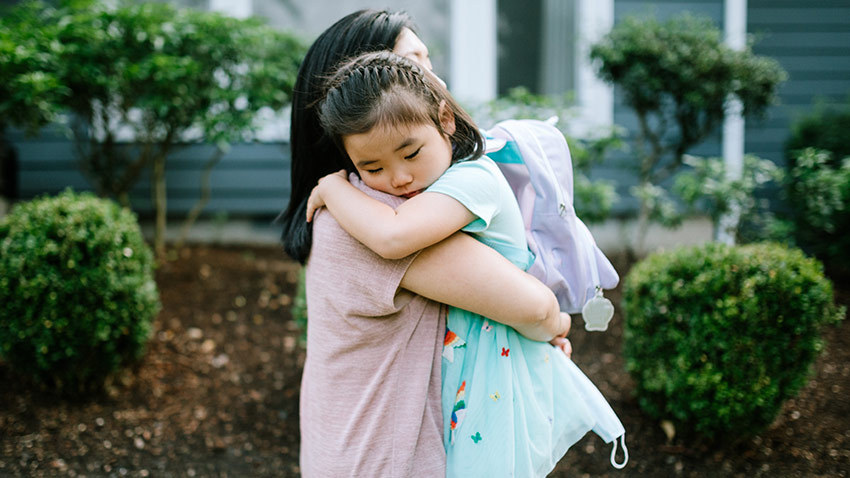
The summer months may seem a little hectic with kids home from school and new schedules to adjust to. However, it’s actually a great opportunity for you to pay closer attention to how your children behave, especially during the hours when they would normally be in a classroom.
And as summer winds down, it’ll be important to also take note if your kid seems anxious about returning to school.
For some, it could be a healthy form of anxiety in the form of excitement and anticipation for what’s to come in the new school year. Yet, for others, it may signal a more serious sign of anxiety.
But how can you tell the difference between “normal” nerves and something more serious? University of Michigan child and adolescent psychiatrists, Gregory Hanna, M.D., and Nasuh Malas, M.D., MPH, who is director of pediatric consultation and liaison psychiatry services at University of Michigan Health C.S. Mott Children’s Hospital, help answer that question along with screening guidelines, what “healthy” anxiety looks like, when to seek professional help and how to talk about anxiety with your kids.
What exactly is children’s anxiety?
“Anxiety is the experience that youth may have when they have distressing thoughts, worries or negative perceptions about a future or anticipated event and/or may have a limited capacity to manage distressing thoughts or worries,” said Malas.
In small doses, anxiety may be motivating, but in severe cases, it can impact many aspects of a child’s life—school, medical care, friendships, family interactions—and become debilitating.
What signs or symptoms of anxiety can you look for in your kids?
Signs of anxiety can range from child to child.
Some physical changes can include muscle tension, headaches, stomachache, restlessness, feeling their heart racing and sweating. Behaviors such as avoidance, tearfulness, withdrawal from activities, panic, irritability, or expressions of fear—all could stem from anxiety.
Like Podcasts? Add the Michigan Medicine News Break on Spotify, Apple Podcasts or anywhere you listen to podcasts.
Parents can pay attention to their child’s development and daily activities to watch for any debilitating signs of anxiety, Hanna says. For example, a child or adolescent who suffers from separation anxiety—which may show through constant thoughts about the safety of guardians—may have a low appetite or sleep problems.
“In this scenario, they may become fearful at night, unable to sleep alone, have fears of the next day at school without their guardian, or have a poor appetite along with stomach aches,” said Hanna. “All these signs can affect their development and interfere with usual daily life.”
Hanna also points out to parents and caregivers that when their child is in school, having open conversations with their teachers may provide helpful insight to how the child is behaving outside of the home. Their teachers may notice if a child is being unusually shy and not interacting or participating in class. Conversely, the teacher may not be aware of behavior that could be happening at home and by parents having clear communication with teachers, a better understanding can help support the child.
Is any amount of anxiety considered “healthy”?
Yes. Anxiety is a part of daily life. When someone is feeling anxiety or stress in a non-clinical sense, they are experiencing something innately human. This could be when someone is completing tasks and has mild stress that comes in small doses like before giving a presentation or taking an exam.
SEE ALSO: Back to School Anxiety: How To Help A Child With Anxiety About School | Michigan Medicine
“It’s what can keep us out of trouble when we are preparing to cross the street, or when we go swimming in open waters such as lakes,” said Hanna. “Younger children may have developmentally appropriate fears that fade with increasing maturity, such as fears of the dark or thunderstorms.”
When should you be concerned about anxiety in your child and seek professional help?
If anxiety is persistent and impairing, and even more so when it affects many areas a child’s life—social interactions, school, family life—this is an indication that children need mental health professional support to help manage their anxiety.
Experts also say to watch for anxiety being uncomfortable or distressing for the child. Sometimes signs of anxiety aren’t obvious, and a child appears to be managing when they’re not.
Why are children’s anxiety screening guidelines important?
Earlier this year, the United States Preventive Services Task Force, which is made up of nationally accredited medical experts, issued a draft of guidelines for anxiety screening in children starting as young as eight years old.
Experts explain that the newly drafted guidelines are important for parents to be aware of for several reasons. For one, it adds a larger focus on mental health and screening as part of primary care practices in a time where mental illness among youth is gradually rising, especially with the pandemic.
Other factors that can increase risk for anxiety include disruptions or difficulties with school, bullying, familial stress, challenges in peer interactions, and exposure to traumatic events.

